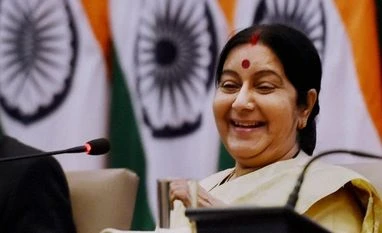A liberalised and simplified visa regime comes into force from Saturday, April 1, which the government hopes would make travel to India, particularly for business, tourism and medical purposes, easier.
The union cabinet had approved the changes in India's visa regime at its meeting on November 30, with the objective of making India an attractive destination for foreign direct investment and portfolio investment, and also boost earnings from tourism, medical tourism and exports.
The cabinet had liberalised the e-Visa scheme, tourist, business, medical and employment visas and suggested introduction of new categories of visas such as 'intern visa' and 'film visa'.
With effect from Saturday, e-visa stands sub divided into three categories - e-tourist visa, e-business visa and e-medical visa.
The e-visa facility has been extended to nationals of 161 countries for entry through 24 airports, from the earlier 16 airports. Entry will also be allowed at three seaports - Cochin, Goa and Mangalore - to tap the potential of cruise tourism from abroad. The service will also be provided soon from Mumbai and Chennai seaports.
Further, the window for application under e-visa scheme has been increased from 30 days to 120 days. The duration of stay on e-visa has been increased from 30 days to 60 days. Double entry has been allowed on e-tourist and e-business visa and triple entry on e-medical visa.
Separate immigration counters and facilitation desks to assist medical tourist have been provided at Indian airports namely, Delhi, Mumbai, Kolkata, Chennai, Bengaluru and Hyderabad, a statement from the government's Press Information Bureau said.
The multiple entry tourist and business visas for a period of five years will now be available to nationals of most of countries. Upon urgent requests, business visa and medical visa will be granted within 48 hours of application. As many as 94 missions of India abroad now have biometric enrolment facilities that has enabled these to start giving five-year long term tourist and business visas from March 1. The statement said the remaining missions will provide the facility in due course.
A new category of visa, the intern, or 'I' visa, is being offered since March 1, 2017, to a foreigner intending to pursue internship in Indian companies, educational institutions and non-governmental organisations (NGOs). This, however, is subject to certain checks and conditions.
The conditions include that the period of visa is restricted to the duration of internship programme or one year, whichever is less. The intern visa will be granted immediately after completion of graduation/post-graduation. Intern visa will be issued with prior clearance from the Home Ministry in case of internship in NGOs or internship involving visit to protected and restricted areas.
Film visa, or 'f' visa, is another new category introduced with maximum duration of one year with multiple entry facility.
The minimum salary limit of for grant of employment visa, which is presently $25,000 per annum, has also been modified. This will facilitate foreign nationals engaged as teaching faculty by the Central Higher Educational Institutions.
The government hopes that the liberalised visa regime would increase the numbers of foreigners travelling to India "substantially in the coming years".
"This will in turn give a boost to the tourism, medical and business sectors resulting in substantial increase in direct and indirect employment in these sectors," a government press statement said.
To read the full story, Subscribe Now at just Rs 249 a month
Already a subscriber? Log in
Subscribe To BS Premium
₹249
Renews automatically
₹1699₹1999
Opt for auto renewal and save Rs. 300 Renews automatically
₹1999
What you get on BS Premium?
-
Unlock 30+ premium stories daily hand-picked by our editors, across devices on browser and app.
-
Pick your 5 favourite companies, get a daily email with all news updates on them.
Full access to our intuitive epaper - clip, save, share articles from any device; newspaper archives from 2006.
Preferential invites to Business Standard events.
Curated newsletters on markets, personal finance, policy & politics, start-ups, technology, and more.
Need More Information - write to us at assist@bsmail.in
)